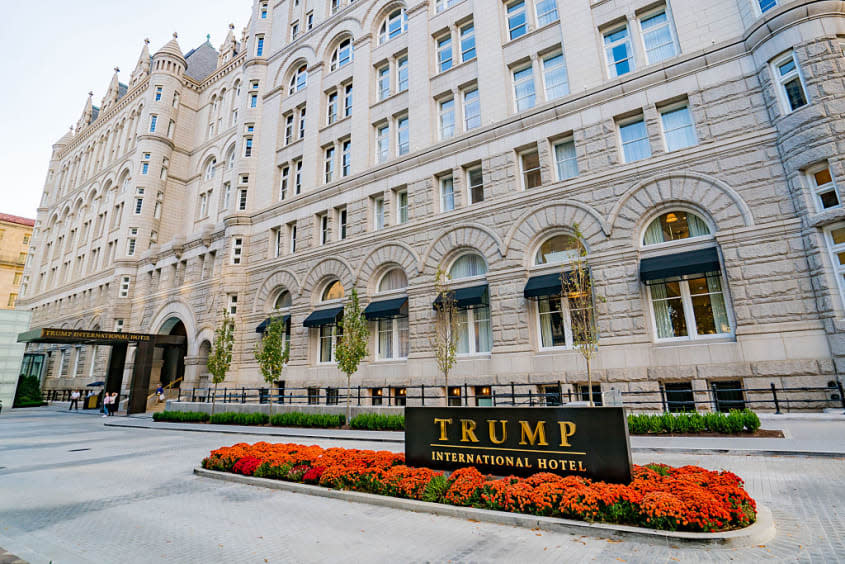Why the Supreme Court was interested in a former Trump hotel

- Oops!Something went wrong.Please try again later.
The Supreme Court in June dropped a high-profile case involving a Washington, D.C., hotel that was once owned by former President Donald Trump. In a strange plot twist, the battle was not coming from the former president, but from the Biden administration.
What were the facts of the case?
The case, Carnahan v. Maloney, would have produced the final say on whether Democratic lawmakers can access government documents relating to Trump's lease on the city's historic Old Post Office. The former president acquired the rights to the building in 2013 and turned it into the Trump International Hotel, where it "became a regular haunt for foreign dignitaries and GOP officials during Trump's presidency," USA Today reported. The hotel, which was besieged by controversies throughout Trump's term, was sold by the Trump Organization in 2022 and is now a Waldorf Astoria.
Democratic congressmen first began pushing for insights into the hotel in 2016, after Trump won that year's presidential election. The Democrats, which had a minority in the House at the time, had originally questioned whether the then-incoming president would have a conflict of interest due to his corporation's ownership of the hotel. These lawmakers had submitted various requests for documents to the General Services Administration (GSA) regarding the hotel, NBC News reported, but the GSA refused to hand anything over, saying individual lawmakers from the minority party didn't have the right to conduct oversight. The GSA had previously said Trump's election as president meant he would have to give up his stake in the hotel — though the agency later backtracked on this after he took office.
The lawmakers eventually sued in 2017, alleging that Trump's continued ownership of the hotel violated anti-corruption provisions. They cited a federal law called Section 2954, also known as the "Seven Member Rule." This allows "any seven members of the House Committee on Oversight and Accountability or any five members of the Senate Homeland Security Committee" to ask for information from a federal agency, The Hill reported. A federal judge threw out the lawsuit, reiterating the GSA's claim that Section 2954 doesn't allow individual members of Congress to conduct oversight. This led to an appeal from the Democratic lawmakers that the Biden administration tried to stop.
The Biden administration was on Trump's side?
In this case, yes — the objection to the lawmakers' request came not from Trump, but from the current White House. This was due to the Biden administration's fear that giving Congress Trump's records would set a precedent allowing "members of the minority — typically largely shut out of decision-making power — to demand significant information from federal agencies and the White House," Politico reported. This "puts the Biden administration in the awkward position of aligning itself with Trump."
The White House's decision to push back against the Democrats is also aligned with the policy of only responding to oversight requests from the House majority, Politico added. This has been the stance of both the Biden and Trump administrations.
U.S. Solicitor General Elizabeth Prelogar defended the GSA's decision not to release information about the hotel in a legal filing for the DOJ, claiming it would allow congressional members of the minority party to harass the executive branch. "A congressional minority — 'or even an ideological fringe of the minority' — could bring cases to 'distract and harass executive agencies and their most senior officials," Prelogar wrote in the filing. She also said there was historical precedent preventing the court from getting involved, writing that a dispute between branches of government is "not of the sort traditionally thought to be capable of resolution through the judicial process."
What happened with the case?
The Supreme Court dismissed Carnahan v. Maloney prior to the end of this judicial term, with the move occurring after Democratic lawmakers voluntarily dropped the case, NBC News reported. This essentially rendered the question moot — for the time being.
As a result of the dismissal, the court also threw out the prior appeals court ruling that revived the case. This more-or-less means no movement occurred on the issue, at least for now, and the justices "will save for another day the issue of whether it is ever appropriate for a minority of members of a congressional committee to be able to demand executive branch documents," CNN reported.
A win for the Democratic lawmakers could have given "members of the minority in Congress more power to probe a presidential administration of the opposite party – even though they wouldn't have the votes needed to issue a subpoena," USA Today reported. While this was not the case, it also doesn't mean the issue is completely dead, as a different case on the issue could always find its way to the court.
Updated July 3, 2023: This story has been updated throughout.
You may also like
Companies plead for workers to come back
'Indiana Jones and the Dial of Destiny' has a disappointing opening weekend

